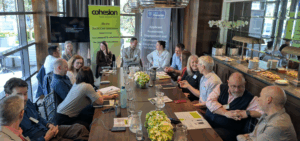As a business we are hugely excited about sponsoring a PhD study. But what’s good about it? What can we all hope to learn from it? And why is it exciting?
This week we talked to John to get the answers to these questions…
“On a personal basis this is a very exciting project to be involved in and one I am very fortunate to be leading. I’ve studied for 4 years and obtained 2 degrees in order to enable myself to undertake a PhD, so this is a huge deal. This opportunity is the dream combination for me. It not only enables me to live out a long held ambition of completing a PhD, it also means working in a very hands-on environment and carrying out some really interesting research.
What really makes this an important project is the impact that this research can have. It is research that will directly impact people’s lives. When thinking about recruitment, you often get caught up thinking about who’s going to be recruited and how it will positively impact the industry, which is tremendously important, but Social Care runs deeper than that.
This project is important because it will impact service-users, and that’s what it all comes down to. Whether it be ourselves, a friend or a relative, most of us will come in to contact with this side of Social Care at some point and we will all benefit from an improved recruitment and selection process.
The area of recruitment and selection has been a passion of mine for a few years now. I have always been interested in this type of work and last year I became a British Psychological Society accredited psychometric test user. This has helped broaden my understanding and leads perfectly into this PhD.
I hope that this opportunity will give me the ability to use all of the various statistical and theoretical techniques I have built up over my years of study. I will especially take great pride in the development of a measurement tool. This is no mean feat and is something of huge significance that will most likely be one of my biggest academic achievements to date.
I am also hugely excited by the prospect of undertaking interviews with care workers. I relish the chance to be able to really get a feel for what the work is like for the workers, what makes them tick and what elements of the job they enjoy, as well as their dislikes. To have the chance to complete research that can have a tangible impact on the jobs and lives of care workers is a great opportunity and a privilege.
Some of the most robust work is research that is undertaken longitudinally and follows participants over time (as oppose to cross-sectional). This type of research, by its nature, is time consuming and hard to do. So again to have the opportunity to do this is great and a really exciting prospect.
Finally, the sector is one that is particularly important to me. This is a sector where the research study to be undertaken can actually impact on the lives of people and make a difference. It is a sector that is largely under researched and one where great strides can be taken. It is a sector that needs to recruit over 1million workers by 2025, and one that often receives a myriad of negative press. I therefore see it as a real opportunity to make a difference and to help tackle some of the challenges that a crucial sector faces going forward.
As previously touched on, I love that this PhD is hands-on and involves active research as opposed to being purely theoretical. I also love that I have the opportunity to work with Cohesion, a successful recruitment company. I am passionate about eventually completing my Chartership and becoming an Occupational Psychologist (as well as doing some consultancy) working with businesses and organisations is something I really relish.
This opportunity has ticked all of the boxes for me.”
For more exciting updates from John, click here.
In the meantime, why not take a look at some of our free Social Care ebooks which further explore the skills shortage, the future of the sector and values-based recruitment.
Stay tuned for more exciting updates!
Written by John Barratt, PhD student at Aston University





